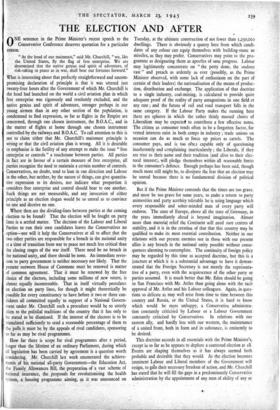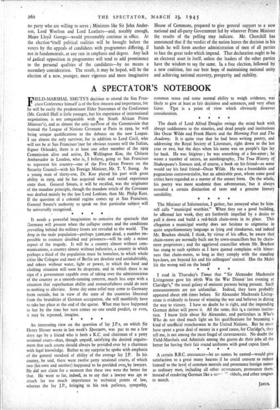THE ELECTION AND AFTER
ONE sentence in the Prime Minister's recent speech to the Conservative Conference deserves quotation for a particular reason.
" At the head of our mainmast," said Mr. Churchill, "we, like the United States, fly the flag of free enterprise. We are determined that the native genius and spirit of adventure, of risk-taking in peace as in war, shall bear our fortunes forward."
What is interesting about that perfectly straightforward and uncom- promising declaration of principle is that it was uttered just twenty-four hours after the Government of which Mr. Churchill is the head had launched on the world a civil aviation plan in which free enterprise was rigorously and resolutely excluded, and the native genius and spirit of adventure, stronger perhaps in our young airmen than in any other section of the population, is condemned to find expression, so far as flights in the Empire are concerned, through one chosen instrument, the B.O.A.C., and in the matter of flights at home through one chosen instrument controlled by the railways and B.O.A.C. To call attention to this is not to claim either that Mr. Churchill's mainmast principle is wrong or that the civil aviation plan is wrong. All it is desirable to emphasise is the futility of any attempt to make the issue "free enterprise or controls" a touchstone between parties. All parties in fact are in favour of a certain measure of free enterprise, all parties recognise the heed to maintain a certain number of controls.
Conservatives, no doubt, tend to lean in one direction and Labour in the other, but neither, by the nature of things, can give quantita- tive expression to its desires, nor indicate what proportion it considers free enterprise and control should bear to one another. Such things are not measurable, and any invocation of either principle as an election slogan would be so unreal as to convince no one and deceive no one.
Where then are the dividing-lines between parties at the coming election to be found? That the election will be fought on party lines is a settled matter. The decision of the Labour and Liberal Parties to run their own candidates leaves the Conservatives no option—nor will it help the Conservatives at all to affect that the two other parties are responsible for a breach in the national unity at a time of transition from war to peace not much less critical than the closing stages of the war itself. There need be no breach in the national unity, and there should be none. An immediate rever- sion to party government is neither necessary nor likely. That the present outworn House of Commons must be renewed is matter of common agreement. That it must be renewed by the free choice of the electors, including some millions of new voters, is almost equally incontestable. That in itself virtually postulates an election on party lines, for though it might theoretically be possible for every constituency to have .before it two or three can- didates all committed equally to support of a National Govern- ment under Mr. Churchill such a procedure would be so utterly alien to the politiCal traditions of the country that it has only to be stated to be dismissed. If the interest of the electors is to be stimulated sufficiently to send a reasonable percentage of them to the polls it must be by the appeals of rival candidates, sponsoring so far as may be rival programmes.
How far there is scope for rival programmes after a period, longer than the lifetime of an ordinary Parliament, during which all legislation has been carried by agreement is a question worth considering. Mr. Churchill last week enumerated the achieve- ments of his national all-party Government—the Education Act, the Family Allowances Bill, the preparation of a vast scheme of national insurance, the proposals for revolutionising the health system, a housing programme aiming, as it was announced on Tuesday, at the ultimate construction of not fewer than 1,250,000 dwellings. There is obviously a quarry here from which candi- dates of any colour can equip themselves with building-stone or missiles, as they may prefer. Conservatives may point to the pro- gramme as designating them as apostles of sane progress. Labour may legitimately concentrate on "the petty done, the undone vast" and preach as ardently as ever (possibly, as the Prime Minister observed, with some lack of enthusiasm on the part of certain of their leaders) the nationalisation of the means of produc- tion, distribution and exchange. The application of that doctrine to a single industry, coal-mining, is calculated to provide quite adequate proof of the reality of party antagonisms in one field at any rate ; and the future of rail and road transport falls in the same category. If the Labour Party makes the running here there are spheres in which the rather thinly massed choirs of Liberalism may be expected to contribute a few effective notes. The citizen as consumer tends often to be a forgotten factor, for vested interests exist in both camps in industry ; trade unions on occasion can do as much to force up prices as cartels. The consumer pays, and is too oftea capable only of questioning incoherently and complaining inarticulately ; the Liberals, if they are true to their name and their tradition (and alive to their elec- toral interest), will pledge themselves within all reasonable limits to the consumer's defence. Enough perhaps has been said, though much more still might be, to dissipate the fear that an election may be unreal because there is no fundamental division of political opinion.
But if the Prime Minister contends that the times are too grave, and must be too grave for some years, to ;flake a return to party animosities and party acerbity tolerable he is using language which every responsible and sober-minded man of every party will endorse. The state of Europe, above all the state of.Germany, in the years immediately ahead is beyond imagination. Almost more than material relief the Continent will need sure centres of stability, and it is in the creation of that that this country may be qualified to make its most essential contribution. Neither in our relations with our present enemies nor in those with our present allies is any breach in the national unity possible without conse- quences alarming to contemplate. The continuity of foreign policy may be regarded by this time as accepted doctrine, but this is a juncture at which it is a substantial advantage to have it demon- strated that the Foreign Secretary is not merely the representa- tive of a party, even with the acquiescence of the other party or parties assumed. It is much better that Mr. Eden should be going to San Francisco with Mr. Attlee than going alone with the tacit approval of Mr. Attlee and his Labour colleagues. Again, in ques- tions so delicate as may well arise from time to time between this country and Russia, or the United States, it is hard to know which would be more unhappy, a Conservative administra- tion constantly criticised by Labour or a Labour Government constantly criticised by Conservatives. In relations with our eastern ally, and hardly less with our western, the maintenance of a united front, both in form and in substance, is eminently to be desired.
This doctrine accords in all essentials with the Prime Minister's, except in so far as he appears to deplore a contested election at all.
Events are shaping themselves as it has always seemed both probable and desirable that they would. As the election becomes imminent Labour and Liberal members of the Government will resign, to gain their necessary freedom of action, and Mr. Churchill has stated that he will fill the gaps in a predominantly Conservative administration by the appointment of any men of ability of any or no party who are willing to serve ; Ministers like Sir John Ander- son, Lord Woolton and Lord Leathers—and, notably enough, Major Lloyd George—would presumably continue in office. At the election 'itself political realities will be brought before the voters by the appeals of candidates with programmes differing, if not in fundamentals, at any rate in emphasis and degree. Any lack of jadical opposition in programmes will tend to add prominence to the personal qualities of the candidates—by no means a secondary consideration. The result, it may be hoped, will be the election of a new, younger, more vigorous and more imaginative House of Commons, prepared to give general support to a- new national and all-party Government led by whatever Prime Minister the results of the polling may indicate. Mr. Churchill has announced that if the verdict of the nation leaves the decision in his hands he will form another administration of men of all parties to face the great tasks which impend. That declaration ought to be an electoral asset in itself, unless the leaders of the other parties have the wisdom to say the same. In a free election, followed by a new coalition, lies our best hope of maintaining national unity and achieving national recovery, prosperity and stability.



























 Previous page
Previous page